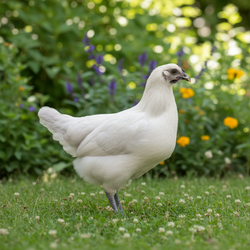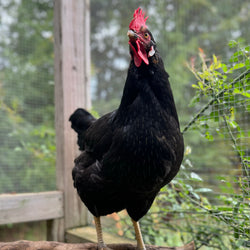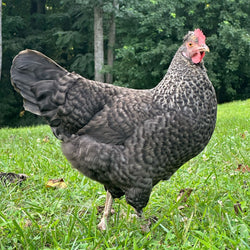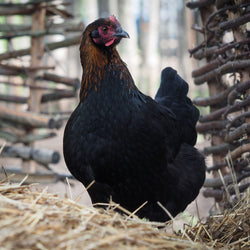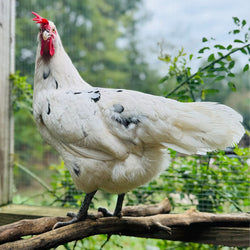page=13/--
Frequently Asked Questions
Here we answer the most commonly-asked questions about ordering, chicken care, and more.
All about Blackhead disease
All about Blackhead disease|Blackhead disease isn't likely to actually turn your chickens' heads black (thankfully!). In fact, it is much more likely to affect turkeys (wild or domestic) than your chickens. Interestingly enough, in history there were apparently some cases of turkeys whose heads actually did turn black because of this disease. Caused by a protozoan, it's important to keep your flock on a regular worming schedule to protect them from this disease. Read on to find out more: Blackhead Also called Enterohepatitis, histomoniasis Prevalence Common in turkeys, rare in chickens Signs General signs - Sometimes no symptoms. Other times,...
Read MoreAll about Infectious Bursal Disease
It's always a good idea for chicks to have a lot of protein in their diet, right? Not necessarily! Infectious Bursal Disease is more prevalent in flocks that are fed high-protein (24%) feed. It can cause illness and death, especially in chicks that are are 3 - 6 weeks of age, so keep a close eye on your babies when they're that age! Keep reading to find out more: Infectious Bursal Disease Also called IBD, Gumboro Prevalence Common in large flocks Signs General signs - Fluffed feathers, general lethargy, loss of appetite, illness/deaths usually at 3 - 6 weeks of...
Read MoreAll about Marek's Disease
Marek's disease is a dreaded illness that can be contracted by chickens nearly anywhere in the world. It is almost always fatal, and even birds that survive will be continue to be carriers their entire life. Most healthy birds are capable of fighting off the virus so symptoms do not develop, but in times of stress the virus may overwhelm their defenses and they may become symptomatic. We offer a vaccination for Marek's disease, which can greatly reduce mortality in a flock if the disease is contracted. Read on to find out more. Marek's Disease Also called Neurolymphomatosis, MD, range...
Read MoreAll about Encephalomalacia disease
Unlike most diseases, Encephalomalacia (try saying that three times quickly!), is not caused by a virus, bacterium, or fungus. Also known as "crazy chick disease," it is caused by a Vitamin E deficiency which results in neurological damage over time. You can keep this from ever happening to your flock by making sure they have free choice access to nutritionally-complete feeds appropriate to their age. Read on to find out more: Encephalomalacia Also called Crazy chick disease Prevalence Rare, particularly so in backyard flocks with access to pasture. Signs General signs - Sudden loss of balance, circling, head shaking or...
Read MoreAll about Nutritional Myopathy disease
Nutritional Myopathy--which can cause chickens to have muscular degeneration or slowed growth--is caused by a lack of vitamin E, along with a deficiency of methionine and cysteine in a flock's diet. To prevent this from happening to your flock, make sure you feed them a complete, nutritionally-balanced feed, and not just scratch or kitchen scraps. Read on to find out more. Nutritional Myopathy Also called White muscle disease, Nutritional Muscular Dystrophy Prevalence Uncommon Signs General signs - Muscular degeneration, slow growth. Cardinal or diagnostic signs - Muscular degeneration occurs primarily in breast and legs. Necropsy shows white muscle striations. Cause/s...
Read MoreAll about Mycotoxicosis disease
When feed gets wet, it can grow mold or other fungi that can produce toxins that are dangerous or even deadly for chickens. When a bird ingests those toxins, the result can be Mycotoxicosis, which can produce varied symptoms among your flock. The simplest preventative? Keep your feed dry. Read on to find out more information: Mycotoxicosis Also called Aflatoxicosis, Aflatoxicosis, Ergotism, Fusariotoxicosis, Oosporein Mycotoxicosis, other mycotoxicoses (consumption of toxins produced by fungi) Prevalence Sporadic Signs General signs - Various, depending on the type of toxins ingested, but often watery droppings, egg quality issues, lesions, slowed growth or weight loss....
Read MoreAll about Fowl Spirochetosis (Brachyspira) disease
Giving your flock plenty of space and a clean, dry, coop and run area with little stress is more than just a luxury for your birds; it's also a great way to help protect them against many diseases, including Spirochetosis. Spirochetosis can be caused by the Brachyspira or the Borrelia bacterium. Both are treatable using antibiotics--under a veterinarian's care. This article examines the type caused by Brachysprira bacteria: Fowl Spirochetosis (Brachyspira) Also called AIS, Avian Intestinal Spirochetosis, Avian Spirochetosis Prevalence Common in some areas Signs General signs - Sometimes no symptoms. Other times, symptoms may include lack of appetite, lethargy,...
Read MoreAll about Fowl Spirochetosis (Borrelia) disease
Spirochetosis is a tick-born bacterial disease that is rare in the United States (thankfully!). Spirochetosis can be caused by the Brachyspira or the Borrelia bacterium. Both are treatable using antibiotics--under a veterinarian's care. This article examines the type caused by Borrelia bacteria: Fowl Spirochetosis (Borrelia) Also called AIS, Avian Intestinal Spirochetosis, Avian Spirochetosis Prevalence Uncommon in North America, but more so in the south because the primary tick that spreads the disease prefers a warm climate. Climate change is likely to make this infection more common in the future. Signs General signs - Sometimes no symptoms. Other times, symptoms may...
Read More







"The Clubhouse" Coop
Easy to assemble and built to last, the Clubhouse Coop is the perfect starter coop for a small flock.


